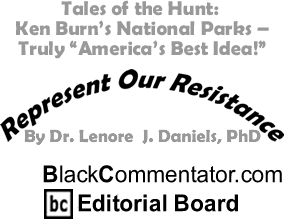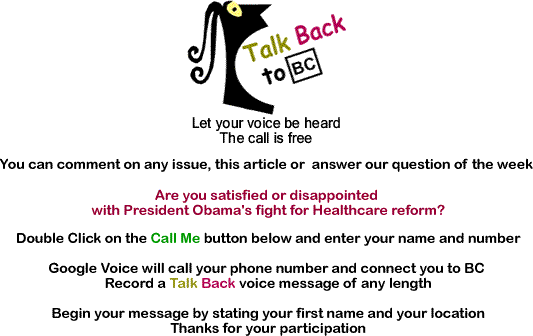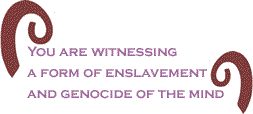
|
||||||||||||||||||||||

|
|
 |
|
Chris Hedges has it right again. In his article, “The War on Language,” September 28, 2009, Hedges writes: “those who seek to dominate our behavior first seek to dominate our speech.” This
emptiness of language is a gift to demagogues and the corporations
that saturate the landscape with manipulated images and the idiom
of mass culture. Manufactured phrases inflame passions and distort
reality. “Infantile slogans” and “clichés” are hallow to the literate, writes Hedges, but invested with power, they are heard everywhere around the planet until they seem to become the driving force of human existence. I
read Hedges’ article after viewing the first episode of Ken Burn’s
12-hour PBS presentation, The National Parks:
Ten years in the making, the PR gang for America’s Best Idea informs us that, for Burns, this film is an “unabashed love letter.” “ These parks are for the people! “Our national parks belong to all of us.” The parks, the waterfalls, trees, animals - need protection! In the background is the faint sound of Indian American music. The
first few minutes of the opening, I guess, seems intended to make
In
passing, we hear of Chief Joseph and the Nez Pez Indians
hunted down by the cavalry while - the main point - Americans
were touring the area! The American visitors, in particular
a couple, were trying to enjoy the scene when these Indians appeared!
Imagine that! The man was shot in the head by a stray bullet,
but he survived. His wife had the right to record this story,
to put into the history of Yellowstone Park, the day their tour
was interrupted by Indians - who, what - should have been
removed to reservations already? And, too, in passing,
the voice tells us that 90 Nez Pez Perce, mainly women and children
were killed while they slept in the What
did the Ahwahneechee have to say about this? They were not asked.
Work on making
And
the Ahwahneechee and the Nez Pez Perce? What of their memories
and hopes? What will they pass along to their children? Are the
Ahwahneechee and the Nez Pez Perce even American for Burns
and his writing team? You would never know that millions of indigenous
people inhabited not only the regions of these national parks
- but all of the The “story of the national parks is the story of people,” the film’s narrative tells us. People, like you the viewer - the American viewer - willing to save “some portion of the land they love.” It is a capitalist venture - from the removal of the indigenous populations to the establishment of riverboat cruises, giant-screen movies, tram rides, and concession stands. When the first “tourists” came to the inhabited land, they asked the typical American question: How to make money from this land. Thus, the great idea was born - again! In other words, it is not cheap to take the family to a national park that “belongs to you.” The national parks are a capitalist gold mine! But the narrative speaks of a great American idea! You cannot see or hear the cash registers, but they are there - thousands of them ringing up the profits! And
what would one great American idea be without its evil twin? Burns
and his writing team, like any good What
cowardly and ignorant lions! The hunters not only know how to
hunt, but also how to use the remains of the carcass to fuel the
It is all for you - the national parks and the whole narrative of American greatness for the small price of your mind! Rebecca
Adamson (Cherokee) is a braver woman; she managed to watch two
additional episodes of Burns’ documentary. I, on the other hand,
had not planned to watch America’s Best Idea until I spoke
with Adamson for the first time last month. For this article,
Adamson and I talked, as she noted, about the “stark difference
of worldviews” between the indigenous people’s silent story of
genocide and Ken Burns’ American story of ingenuity. It
was all about establishing the Northern Pacific Railroad, said
founder of First Peoples Worldwide.org.
President Teddy Roosevelt (a great hunter) thought of the “To be fair to Ken Burns, he does mention the evictions of the indigenous people,” Adamson said. But “the history of the parks is a war story, a war of world views.” And Ken Burns, an awarded hunter, cannot tell that story, but he can pull together “manipulated images and idioms,” to satisfy the capitalists behind the conservationist movement. He is a master at cultural warfare. Make it seems as if it is all about nature. Burns “missed the plot,” Adamson said. “People think you can take nature and put it over there and go make a profit.” Bottom line, it is about capitalism, Adamson reiterated. The park industry only considered the indigenous animals after someone noted that people were mistreating the animals. “They turned to something called ‘wild life management’” which then turned the parks into “amusement parks.” If
it is not outright removal of the indigenous population, it is
encroachment that threats indigenous way of life. Slowly, people
are forcibly removed from the land so the wealthy can develop
unsustainable conditions for the whole planet. Ken
Burns and the writing team of There
is a film Ken Burns will not produce for PBS or any media outlet.
But it, too, is guided by the narrative of Manifest Destiny. On
the hunting grounds of But we have so few of the hunted awake, and a Ken Burns or Fred Upton can count on that! It
is no secret that Black America’s house is divided. Too many are
trapped to their desire for gold and power. In turn, their desires
are wedded to the language of Manifest Destiny. You and me, Master,
“we” is fighting the “enemy”! That element of the Black
and Brown community in the
While,
as Tiokasin Ghosthorse states, the ingenious people in the We will work to put an end to the hunter’s narrative! BlackCommentator.com Editorial Board member, Lenore Jean Daniels, PhD, has been a writer,
for over thirty years of commentary, resistance criticism and
cultural theory, and short stories with a Marxist sensibility
to the impact of cultural narrative violence and its antithesis,
resistance narratives. With entrenched dedication to justice and
equality, she has served as a coordinator of student and community
resistance projects that encourage the Black Feminist idea of
an equalitarian community and facilitator of student-teacher communities
behind the walls of academia for the last twenty years. Dr. Daniels
holds a PhD in Modern American Literatures, with a specialty in
Cultural Theory (race, gender, class narratives) from |
|
 |
|
Any BlackCommentator.com article may be re-printed so long as it is re-printed in its entirety and full credit given to the author and www.BlackCommentator.com. If the re-print is on the Internet we additionally request a link back to the original piece on our Website. Your comments are always welcome. eMail re-print notice
If you send us an eMail message we may publish all or part of it, unless you tell us it is not for publication. You may also request that we withhold your name. Thank you very much for your readership. |
|
| |
|
| October
8 , 2009 Issue 345 |
|
| Executive Editor: Bill Fletcher, Jr. |
| Managing Editor: Nancy Littlefield |
| Publisher: Peter Gamble |
| Est. April 5, 2002 |
Printer Friendly Version
in resizeable plain
text format or pdf
format. |
 |

|
| |
| |






























 According
to the PR surrounding Burn’s film, the production team is preparing
several events across the country in hope of drawing more visitors
to the national parks. David Rockefeller, Jr., Vice Chairman Emeritus
of the National Park Foundation, the National Parks Conservation
Association, and Friends of Acadia sponsored events in August.
As an honored guest, Burns attended the event in formal attire.
His usually blue jeans were left hanging in the closet! He is
a man of the people, out of place among the big corporate boys!
According
to the PR surrounding Burn’s film, the production team is preparing
several events across the country in hope of drawing more visitors
to the national parks. David Rockefeller, Jr., Vice Chairman Emeritus
of the National Park Foundation, the National Parks Conservation
Association, and Friends of Acadia sponsored events in August.
As an honored guest, Burns attended the event in formal attire.
His usually blue jeans were left hanging in the closet! He is
a man of the people, out of place among the big corporate boys!
 It
is all about good old American thought and ingenuity! Burns and
his team of writers offer the words of the founders of
the national parks without question. Since the founders
of the parks described their activity as examples of the Lord’s
work, the footage in the first episode presents beautiful
images of the Sequoia trees and the voice over equates these images
to natures “cathedral.” In turn, these founders, good and
thoughtful people, believed the national parks would come to symbolize
a “refuge for human beings seeking to replenish their spirit.”
(This must be some kind of “peace” time activity!). And the voiceover
offers this summation: the national parks will be “geographies
of memories and hope” for countless American families who will
come to “forge an intimate connection to their land” and pass
these memories and hopes “along to their children.”
It
is all about good old American thought and ingenuity! Burns and
his team of writers offer the words of the founders of
the national parks without question. Since the founders
of the parks described their activity as examples of the Lord’s
work, the footage in the first episode presents beautiful
images of the Sequoia trees and the voice over equates these images
to natures “cathedral.” In turn, these founders, good and
thoughtful people, believed the national parks would come to symbolize
a “refuge for human beings seeking to replenish their spirit.”
(This must be some kind of “peace” time activity!). And the voiceover
offers this summation: the national parks will be “geographies
of memories and hope” for countless American families who will
come to “forge an intimate connection to their land” and pass
these memories and hopes “along to their children.”
 It
is enough to make you sick if you know American history - the
reality of the
It
is enough to make you sick if you know American history - the
reality of the  Yet
when the Cherokee in
Yet
when the Cherokee in 










